Did you know that as a short-term vacation rental owner you can promote your property online successfully, without having to rely on OTAs such as Airbnb, Homeaway, Vrbo, or Booking.com?
Yep, it’s true – and in this post we’ll show you how, even if you’re not a marketing expert or an advertising guru, and have zero desire to spend all day on social media.
So, if you’ve ever struggled to make your short-term rental stand out from the crowd and make sure you get enough bookings to be profitable long-term, you’re in the right place.
Keep reading, and we’ll explore how to set up a great marketing strategy to attract bookings from your ideal clients – without having to pander to OTA demands, lack of control, unexpected Airbnb cancellation by guests, and commission fees.
Setting up your own website and enabling direct bookings online is the first step – something we know a thing or two about here at Boostly. We specialise in helping Airbnb hosts and Airbnb co-hosts just like you to get direct bookings consistently and reliably, no OTAs required.
And with a little bit of know-how and planning, you can easily learn to effectively market your business yourself, and ensure that you still get bookings through the door without relying on OTAs to get the word out. Here’s how.
Why be dependent on OTAs like Airbnb and Booking.com? Did you know you can save thousands on commission fees by getting direct bookings? Get our free blueprint on how to double direct bookings for free.
Table of Contents
How do you market a vacation rental?
First things first: You need a direct booking website. This is your “shop window” and the place you want your prospective guests to come to book direct through you.
Nearly all your marketing efforts will ultimately need to lead your prospective guests towards booking a stay and having a website that showcases your property in the best light and offers a direct and easy opportunity for guests to book directly, is paramount.
A website should be modern, with great photos and snappy copy (writing) that gives guests the basic information they need about your place, while also making it sound enticing, unique, and comfortable.
How to build a short-term rental direct booking website
This is our speciality here at Boostly, and we always recommend that short-term vacation rental hosts have a great website that acts as their “home base” on the web.
Your website can be very simple, with only a few key pages. These should include a page showing your property listings and prices, a booking page, and an About page to let potential renters get to know you.
We also recommend having a page or space to include testimonials of past positive guest experiences, to help future guests build up trust in your rental. You’ll need an online booking option, which takes payment and allows guests to choose their dates, look at your room options, and book directly, paying with PayPal or credit card.
There’s a wide range of website builders out there, which enable you to build a simple but great website at a low cost and integrate payment portals too.
The major ones include WordPress (good if you have a little bit of tech know-how), Wix, and Squarespace, but there are others – we recommend having a shop around before settling on one that makes sense for you.
Nearly all offer tutorials online, and good tech support, to help you get your website up and running simply and easily, without needing to know code or have a developer on-hand.
Most website builder platforms also optimise for large screens and for mobiles and tablets too, as – depending on your ideal guests – a significant proportion of your visitors are likely to be on mobile devices.
At Boostly, we also have services that can do all of this for you, with zero fuss.
Put simply, a good website needs:
- Simple and clear layout
- Great, clear and crisp photography
- Clear, friendly and informative copy
- Competitive pricing
- A booking tool that allows guests to pick their dates and pay online easily
- To look good on large screens and mobile

Good website writing
Remember that with all copy, the idea is to show your personality and style while never forgetting to answer the questions: “Why does the reader or guest care? How does this help the reader/guest?”
Your copy can be friendly, informal and in your own style, but it must talk directly to the reader, and always have their needs and questions in mind.
It should also be short, to the point, and easy to read. Double-check spelling, typos and grammar – getting this right looks professional and shows guests you pay good attention to detail.
When writing your website copy, we suggest thinking about including the following:
- What is unique or special about your property or location?
- What special facilities do you offer that you can highlight?
- What would you want people to tell others about your place if they were recommending it to a friend by word of mouth?
- Basic details such as size of rooms, bed numbers, extra facilities, check-in or check-out time, and whether you include amenities such as hairdryers and ironing boards.
- Is it pet-friendly/child-friendly?
- Do you cater for guests with accessibility needs or dietary requirements?
- What attractions or great restaurants etc exist nearby?
Make sure the homepage shows off your very best photos and shows what a stay with you will look and feel like.
Keep the copy well-written, short, punchy and friendly, appealing to your target audience. Give them the info they need to know quickly and easily, so they know at a glance if your place is for them.
How can I promote my vacation rental for free?
Social media is the best way to do this, as you can set up an account for free, and start leveraging the different tools to find your ideal customers, bring them to your page, and ultimately to your booking site and payment page!
The key to social media is to remember that it’s social. This means that you’ll want to choose a platform where your ideal guests are hanging out, and go and interact with them before they even consider making a booking.
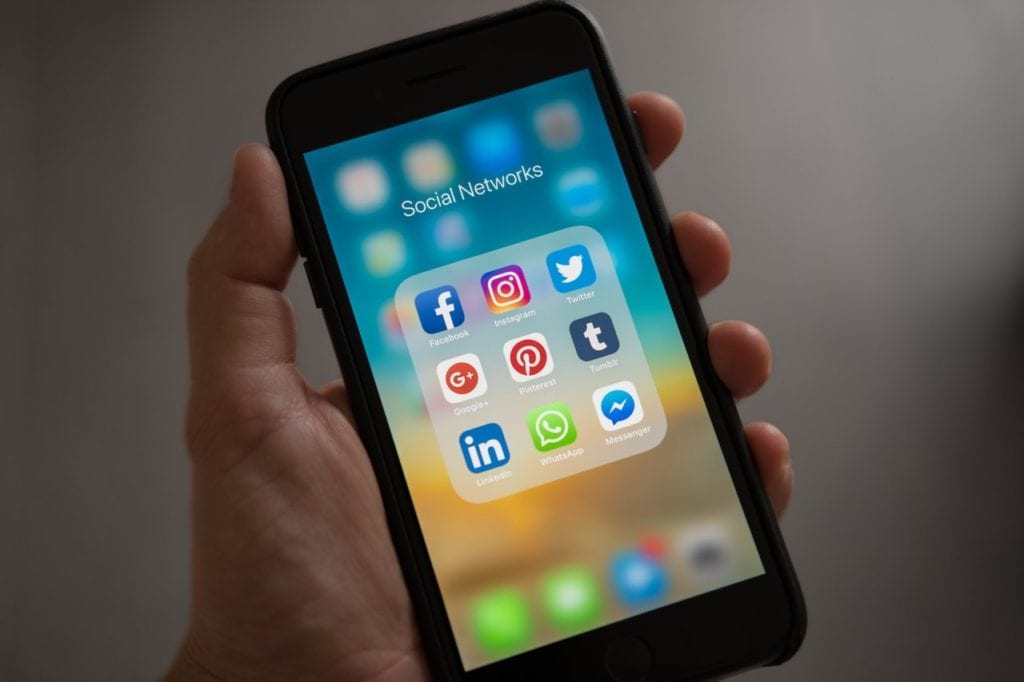
That means choosing 1-2 main platforms used by your ideal guest (rather than your own favourite platform personally), and investing time growing accounts on a few of those platforms well, rather than spreading yourself too thin across five random channels.
Here, we’ve given you a summary of some of the biggest platforms, so you can choose your ideal media and get started.
- The app of choice for lifestyle brands and influencers.
- Visual app that allows you to post static images, live video, daily updates on Stories, short videos on Reels, and longer videos on IGTV.
- 51% of users are women, and one billion people use it every month.
- Tends to be used by people in their late 20s to early 40s, but not exclusively.
- 50% of people have visited a website to buy or book after seeing something on Instagram.
- High-quality photos and videos are key, but captions are also important. You could mix and match long and short captions to see what works best.
- You can also set up your own hashtag, and ask people to post reviews of your place when they stay using the hashtag. For example #SuffolkHillHuts. This means all your posts, or user-generated content (when others post using your hashtag), will be in one place and people can browse them at a glance to learn more.
- Hashtags help you get seen and they’re important. Make them as specific as possible and try to avoid ones that have been used millions of times. Niching down, staying small, and focusing on local business can help.
- Include a CTA (call to action to ask people what you want them to do, e.g. click on a link, comment, send you a Direct Message (DM)) on every post. This doesn’t have to be salesly, you could just ask people to DM you with their favourite holiday destinations to get conversations started.
- Instagram does not allow links in posts, so you can prioritise DMs, comments, or ask people to click the one link you have on your “bio” page. This might be to your vacation rental website homepage, or a specific page, depending on your goals.
- Visual app and website that works like a search engine, but with image results.
- Each image is clickable and links back to a website.
- 322 million monthly active users.
- Mainly women, with 70%/30% female to male split.
- A third of users in the US scroll Pinterest to follow brands and buy.
- 77% of weekly “Pinners” have discovered a new brand or product through Pinterest.
- Great for blog posts or specific website content, as each image can link directly to a website or other URL.
- Make your own “pins” simple and easy to read in thumbnail form, with great imagery and photography to entice people to click through and read.
- People use Pinterest like a search engine, so for best results, think hard about the specific and niche “keywords” and terms people might search before finding your property.
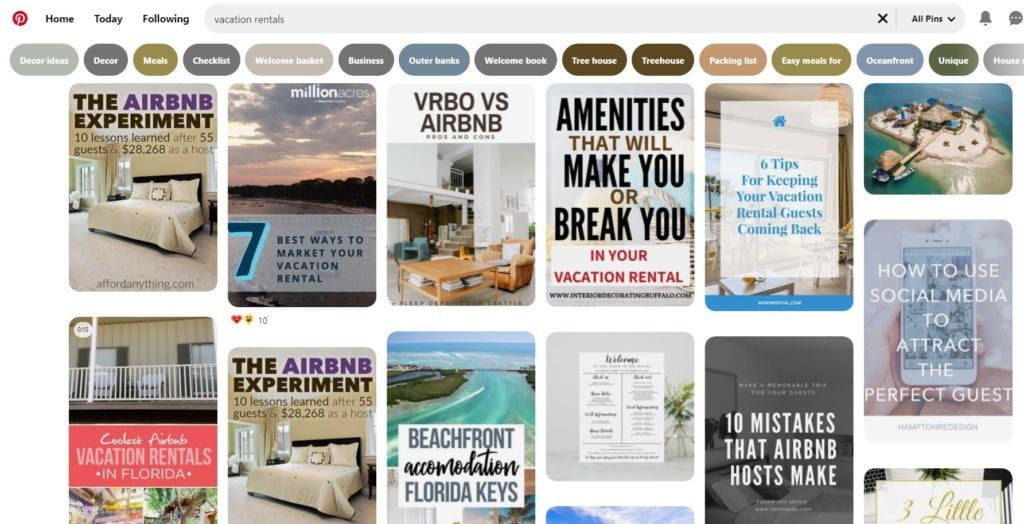
- The biggest social media app, with 2.74 billion monthly active users.
- Great for longer posts, and photos, but always prioritises video content, especially if it’s shareable, inspirational, aspirational, or especially cute or appealing.
- 57% of the audience is male and 43% female.
- Just 32.4% of Facebook’s audience is 25-34, making its users slightly older than those other, newer social media platforms (such as TikTok or even Instagram!).
- Has Personal pages, Business pages, and Groups.
- Prioritises sharable, uplifting content that prompts comments, likes, and discussions.
- Allows longer posts – so great for writing or blog posts.
- Allows links in posts, which allows you to link back to your website or other pages.
- The original “microblogging” website, Twitter features short messages that can also include media content such as photos or videos.
- 187 million daily active users.
- 70% male to 30% female split.
- The largest demographic is 25-34 years old.
- A major source of news, with 59% of users scrolling for news updates.
- Video is on the increase, with 62% more video views in 2020 than in 2019.
- Allows you to place a link in each post, so you can share regular content or direct clicks straight back to your site or page.
- You can also share great images and video snippets for extra engagement.
- Allows hashtags (just like Instagram) to enable you to group your posts, provide them all in one place, and encourage your guests to post their own content using your hashtag.
- Social media, but for business professionals.
- A great place to find corporate or business guests.
- Smaller than other networks, but known to be more trustworthy, with 73% of users saying that it protects their data, versus 53% saying the same for Facebook.
- 722 million members, across 200 countries worldwide.
- 57% male and 43% female.
- Particularly good for sharing news, blog posts, and personal responses to news stories.
- Allows you to build your business network and improve your professional reputation.
The key to social media success is to remember that “vanity metrics” are not what will grow your business. “Likes” and “pins” may look good on your page, but if they’re not translating to clicks or messages, then they’re almost useless from a business point of view.
Social media is called that because it uses the power of social relationships, meaning that you should ideally prioritise booking enquiries, website visits, and link clicks over likes, comments, reposts or shares.
These things can help spread the word about your business and aren’t all bad – but it’s the bottom line bookings that will really make your rental profitable long-term.
Most social media platforms will work best if you post a mix of engaging and entertaining content, including questions and educational content, mixed in with perhaps 10% of overtly sales content only.
This helps followers learn who you are, and builds up that crucial “know, like and trust” factor with you as a person or business before you ask them to book. This strikes the right balance between friendly and salesy.
People buy from people, not faceless businesses.

That’s why the best use of social media is to demonstrate your personality, humour, attention to detail, knowledge, and expertise. Once you’ve built up rapport with your ideal guests in this way, it’s then much easier to “sell” and ask for the booking naturally.
🚀 Pro tip: Most social media platforms work best if you interact with them more than you post yourself - though you should post consistently too.
Don’t just scroll and run, or post and run. Chat to people, go and find things you’re interested in, pin, like, comment, or share things you see. The idea is to socialise as well as post, for the best results.
In real life, you wouldn’t go into a room, shout your news, try to sell something with no build-up, and then leave – so don’t do it on social media either.
How can I increase my vacation rental bookings?
Unfortunately, you can’t just throw up a good website and post a couple of photos on Instagram, and think people will be banging down your door. If it were that easy, everyone would be doing it.
That’s just not how it works.
Sometimes we need to do a little more to get the right people in front of your website and clicking on that “book” button, even if our organic (read, non-paid) social media strategy is working well. This is especially true if you’re new to the scene.
SEO
SEO stands for “search engine optimisation”, and it’s basically the main way that search engines index your content, and show it to people who search online.
Great SEO means that you’re more likely to show up on page one of Google (other search engines are available) and get more clicks and eyeballs on your page.
Learning and implementing SEO is a full-time job in itself, but there are a few things you can do to start ranking highly and improve your content’s online visibility.
Think in terms of keywords, and do a quick Google search before you start writing or creating something, to see what else is popular on the topic. You want to find a niche or an original angle on a popular topic, but not so obscure that people will never find it.
If you were typing this topic into Google, how would you search? What keywords would you use? Try to get as many of those into your blog post, headline, image file names, and website content as possible without making it too obvious or clunky.
Many website builders have SEO “plugins” available, so you can check your writing for keywords. There are also free tools such as Ubersuggest that can help you dip your toes into the water with SEO and they’ll be well worth it for your business.
Blogging
Blogging is a great way to bring more visitors to your site or page regularly, and it offers you the chance to showcase your property as well as build a personal brand that will help to build rapport with potential guests.
It usually refers to regular content published on your site, especially long-form written pieces.
You can write whatever you want – behind-the-scenes tales, news takes, reasons why you set up your business, or useful “list” posts.
Think about why someone might be interested in reading your blog, what kind of content really draws you in when you’re online, and write a regular piece (at least once a week) and post it, using social media to draw people in. Remember to give your posts a snappy headline.
On social, you could post a snippet of your blog post, and then ask people to click or DM you for the full link to read/watch in full. You can also send a snippet to your email list and let them know that there’s been a new update.
Blogs don’t have to be writing; you might create a podcast or film a weekly update video and post it on Anchor, Instagram, or YouTube, depending on how techy you are. Whatever form your blog posts take, you’ll need to identify common issues and topics relevant to your business and focus your content around those.
You can also use Google to see what other people are searching for around your topics and write “pillar” posts that will always be useful.
For example, if your vacation rental property is near some world-class golf clubs and that is a major reason people book with you, you could want to write posts such as
- The Top 5 Things All Golf Holidays Need
- The Top 10 Things To Bring on Your Golfing Holiday
This will get people interested in your rental, and learn something useful on your page, without you having to directly sell to them.
This is basic content marketing, and it helps build up trust with people and encourage them to buy from you, without you having to overtly sell in a sleazy, annoying way.
Paid Ads (Or How to Get Ahead in Vacation Rental Advertising)
How to advertise vacation rental properties beyond placement on the major listing sites is a commonly asked question for property managers. While organic (non-paid) traffic is great for engagement, building relationships and growing a sustainable and genuine audience, it’s definitely the slow-and-steady method rather than a get-results-fast option.
Paid ads can help you reach more people more quickly and, when you get them right, they can be dynamite for your email list building (see more below) and getting eyeballs on your content.
The key with paid ads is to get really specific about who you’re targeting. If you try to appeal to everyone, your ad will likely appeal to no-one, and you’ll get lost in the online noise. Be specific about who you want to see your ad, and really get into their head about what will stop their scroll.
Great ads are funny, entertaining, informative, short, sweet, and easy to read or watch without sound, and in seconds. Remember that you’re trying to capture people’s short attention spans, and you want to grab them the second they see your ad.
You might want to test a post, concept or idea organically first, to see if it resonates with people, and then if you’re getting traction there, step it up a notch and put some money behind it.
Remember also that ads will – unless you’re a little further along in the process – mainly target people who don’t know who you are and haven’t heard of your business before, so make sure your ads are clear, and not asking too much.
People are unlikely to book your rental for £1,000 a night from a single ad (although stranger things have happened), but they might sign up to your free newsletter, follow you on Instagram, or Like your Page, take part in a free competition, or grab your free helpful PDF guide to a great short-term rental experience.
Once you’ve captured their info, you can follow up, and guide them along the path to booking in. Ads are where it starts.
Most social media platforms offer paid advertising, but it’s important to think carefully before throwing money at ads, as they can lose cash quickly if you don’t know what you’re doing.
Facebook (and Instagram)
- Still the biggest social media platform in the world.
- Allows you to set up ads once you have a Business Page.
- Allows ads of different types (posts and video) and different sizes.
- Allows you to link to a page.
- The ad and the linked page must look similar so users aren’t surprised when they click (Facebook will check this).
- You can test a few ads at once, to see which ones work better, and take down the lowest-performing ones later.
- There are also rules about what you can and cannot put in an ad, and details such as how much text can sit on an image, so make sure you read up on the policies on Facebook first before wasting your money and risking your profile being suspended.
- Facebook’s Ad Manager portal also allows you to set up ads on Facebook and Instagram at the same time (as Facebook owns Instagram), which is great for targeting two audiences at the same time.
- Link your accounts to do this, and also be aware that Facebook favours landscape content while Instagram favours square and portrait content.
- Allows you to set spending limits on your ads so you don’t run up a huge bill.
- Ads can be optimised to collect email addresses (leads), awareness, traffic (clicks to your site), and much more.
- Allows you to see what’s working in real-time, including views, and cost-per-result.
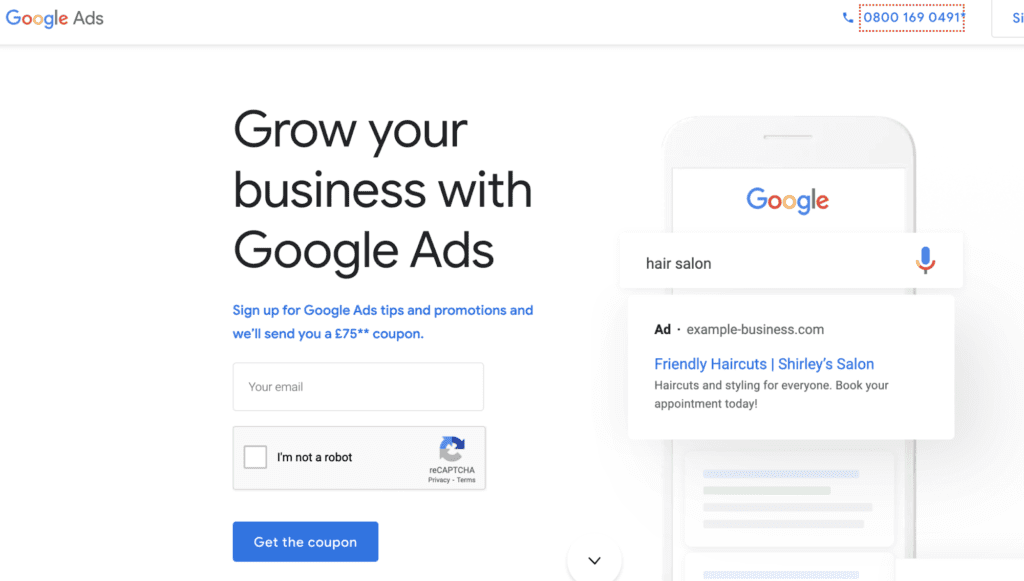
- Google Ads work in a similar way to SEO and keywords, in that they respond to what users type in, and keywords are paramount.
- Allows you to target your audience using the right keywords.
- Get the message across in just a few lines.
- For every $1 spent on Google AdWords, the average business generates $2 in revenue. They can be powerful when done right.
- Just like other ads, success here is in great copy, and knowing exactly what a user might be looking for (their “search intent”) when they go online.
- Lets you adjust your spend and “bids” and lets you track the success of your ads dynamically.
- It’s worth mentioning that Google is now also an OTA, allowing free, organic listings, so take a look at my video on the topic below for more info.
Quora
- Quora is a “questions” website, where people can ask any question they like and receive answers from the community.
- Often described as a “mix of social media and search engine”.
- 300 million monthly active users.
- 57% men, 43% female user base.
- Mainly used on mobile.
- Quora says its users are 65% more likely to report a college degree than average, and 54% more likely to have a household income of more than $100,000.
- Users can not only use Quora like a search engine but also follow topics that interest them and get regular updates.
- This allows you to target your ideal guest or audience, and show your content or rental to them directly, where they already hang out online.
- Allows you to define your budget, audience, and bids.
- Very easy to set up compared to some: only requires two lines of text and a landing page to get started.
- Ads can be optimised to collect email addresses (leads), awareness, traffic (clicks to your site), or even app installations.
- Reddit is a social media site but works more like a forum with strong “communities” inside it.
- 430 million monthly active users worldwide.
- Most popular among people aged 25 to 29.
- There are more than 2.2 million “subreddits” or topics, for almost everything you can think of, and users can follow a variety to stay updated on new posts.
- Users can post short original content, including text, photos, and video, and users can reply, and upvote or downvote the post, causing it to become more or less visible and popular.
- More than half of Reddit users are on desktop rather than mobile.
- Highly-engaged audience, with average time on the site a whopping 10 minutes and 23 seconds, meaning that done correctly, ads can be very effective.
- Reddit says that its ads “influence purchase decisions”.
- Easy to set up an account, and optimise ads for reach, targeting, and structure, depending on your campaign goals and budget.
- The short-and-sweet, fast-moving site for quick and engaging ads.
- An advertising audience of 353 million in 2021.
- Constantly-updating feed means that you want your content to stand out as quickly as possible.
- The tone of Twitter depends on who you follow, but it tends to be more business-like and professional than some of the other social sites.
- Funny, entertaining, interesting or educational tweets tend to do well.
- Allow you to get your content in front of people who otherwise wouldn’t see it.
- Allows you to set goals by objectives and conversion goals, with no minimum spend.
- Allows you to see what’s working in real-time, including views, and cost-per-result.
Consider Email Marketing to Prospective Guests
Think of social media as the first few dates, and email marketing as getting their phone number and continuing to chat, before making it official (the booking, we mean!).
Social media is a great way to introduce yourself and get chatting, but email marketing allows you to keep that person in your contacts, make sure you communicate with them regularly, improve your relationship, and deepen the conversation all the way to the booking button.
By gathering people’s email addresses, you’re giving them a chance to get to know you, and because they’ve literally given you permission to contact them, they’re far more likely to welcome updates from you in their email inbox and build a relationship with your brand, than if you just continued to chat on social.
Also, once you have their email in your list, you own it, meaning that you’ll always have access to those people who’ve opted in for communications. That means if Instagram folds tomorrow, your posts get penalised by the algorithm, or Facebook suspends your account without warning (scarily and surprisingly common), you can still do business.
Long story short, gathering people’s emails and sending them regular updates is the ultimate way to ensure you’re not reliant on OTAs or the whims of social media platforms and algorithms.
Building up and nurturing a great email list of interested potential customers (or repeat guests) builds up brand loyalty, keeps past and future guests engaged and interested, and ensures your property is at the top of people’s minds when they come to book their next stay.
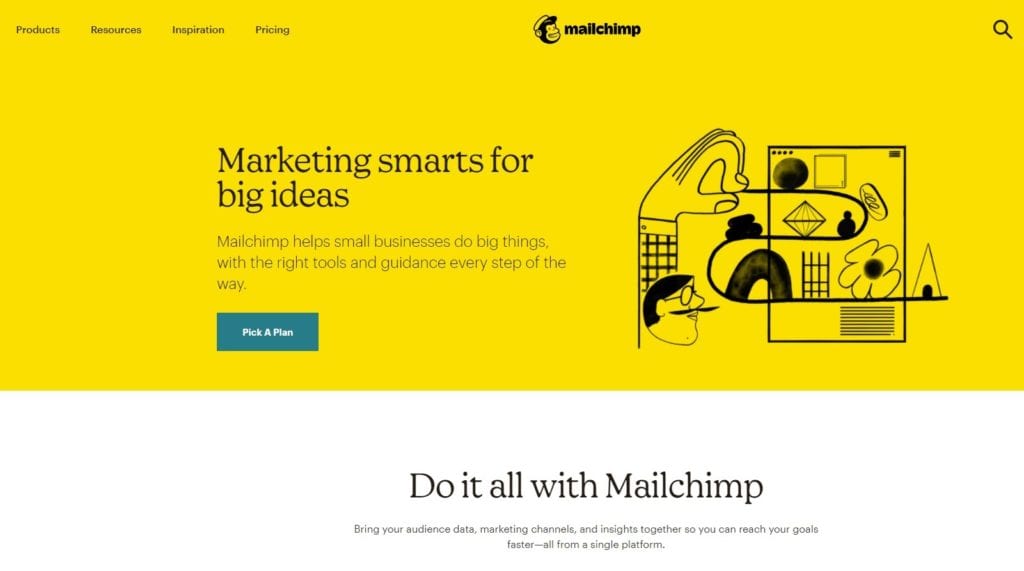
Email List Building Helps Promote Vacation Rentals
In the last section, we explained that people are unlikely to book your rental based on a single ad but that ad might prompt them to sign up for your free newsletter or grab your free guide to a great short-term rental experience.
This is where email marketing comes in.
For each free (or low-cost) resource you give away, such as an e-book or similar, you want to ask people for their email address first. That way you can get back in touch with them again, once they’ve already told you they’re interested in your stuff.
There are many ways to gather email addresses, but you need a place for people to type in their name and email, and then a database where the email is kept. The major platforms for this include:
- Mailchimp
- Mailerlite
- ActiveCampaign
- Flodesk
The one you choose depends on your budget and goals, and how techy you are. Keep in mind that many of the website building platforms we mentioned earlier also offer email marketing integration.
Most allow you to set up forms to collect people’s data, deliver them the free “gift” automatically, and collect the data so you can use it later.
There are a million ways to email your “list”, but just as in social media, it’s good to remember that you’re building relationships with real people, not just “selling” at them. Aim to send 80% non-sales content for each 20% of “book now!” content, for real impact and “know, like, trust” factor.
Ideas might include sending a regular newsletter showing your expertise or trends in the market, your response to a big news story, a snippet, and link to your latest blog post or video, or simply a letter to your potential clients giving them behind-the-scenes updates and chatting about content related to your brand and business. It’s up to you.
Of course, you can also send deals, discounts, and reminders for events such as Christmas, Mother’s Day, Valentine’s Day, or whichever occasions work best for your brand.
Remember to spoil your list and send them freebies, insight, and discounts that they can’t get anywhere else, to give them an incentive to stay signed up.
Also remember that in the EU, and for doing business with people in the EU, you must comply with General Data Protection Regulation (GDPR). Long story short, this means that you can only email people specifically for what they’ve opted in to.
So, you can’t have someone opt in to a PDF e-book and then start emailing them your newsletter without asking. You must get consent at the time of opting in if you want to add people to your general emailing list and target them with your digital marketing campaigns.
And, you must hold people’s data securely, not sell it, and be able to delete it completely when people ask.
You must also give all of your subscribers the option to unsubscribe at any time. And don’t get discouraged if people unsubscribe – this keeps your engagement rate high and means you’re only talking to people who want to listen. Win!
Email automation
Most email providers will allow you to set up simple “automated” emails, which can also help to nurture relationships with your leads.
You can set them up to be personalised and send automatically, for example:
- After a guest signs up to your newsletter – to say thanks and introduce yourself better.
- After a guest books – to say thank you and send them details about their booking.
- Send them reminders of their booking ahead of time.
- To say thank you and ask for feedback after they check out.
- Set up emails to send for specific dates, such as a discount on guests’ birthdays.
- Chase a guest if they come to your website and don’t buy.
- Send them a specific thank you email if they book again.
- Send them treats or deals to say thank you or entice them to rebook.
These emails can often be written once and scheduled to go out automatically, again and again, meaning they can help you nurture guest relationships and go above and beyond in ensuring guest satisfaction, without much extra work from you.
How do I create a vacation rental marketing plan?
We’ve covered a huge amount in this post so far, and hopefully, you’ll now have a bit of an idea of how to use marketing to bring guests to your booking site and door – and get them coming back again too.
However, you can’t just start posting on Instagram and think that will be enough. Marketing works best when it’s all linked to a proper strategy and plan.
The key parts of a plan, and implementing everything we’ve recommended above, start with:
- Setting up your website and booking portal first.
- Choosing 1-2 social media platforms and really focus on building relationships and growing them first before branching out.
- To help you choose: First, consider who your target audience is. Where do they hang out? What do they like or not like? What else do they do, what are their hobbies or work?
- Decide on your content and voice. Businesslike? Casual? Relaxed? Messy and spontaneous? Sweary or prim? High-end + planned? Behind the scenes or always beautiful and prepped?
- Consider what you’re best at. Images, photography, video, speaking, writing? This will affect which platform works for you.
- Considering a weekly new content piece, video or blog post and sharing it with your community, to share information and useful “valuable” content.
- Showing up consistently wherever you’ve chosen to be, e.g. Instagram, and setting a goal – such as one post a day, a Story five days a week, a weekly IGTV or Live – and sticking to it.
- Planning ahead so you can time your content and posts with events such as Valentine’s Day.
- Sending people to your email list (e.g. newsletter or freebie) as much as to your website.
- Nurturing your list via regular updates to grow that “know, like, and trust” factor.
- Trying paid ads once you feel confident on social media.
- Don’t be afraid to experiment and try new things, and see what works best.
Track and tweak
A great marketing plan also means tracking your success.
Decide on the metrics you want to track, such as bookings from Direct Messages, number of DM enquiries, or overall bookings from non-OTA sources.
This will allow you to see how well your marketing is going, and see what you need to tweak, and at what stage of the process. Change one thing at a time and see what happens, so you can see what’s working and what isn’t.
Most social media platforms and ad platforms allow you to track insights, such as reach, impressions, click-throughs, or views, so you can keep an eye on what’s working, and tweak what’s not.
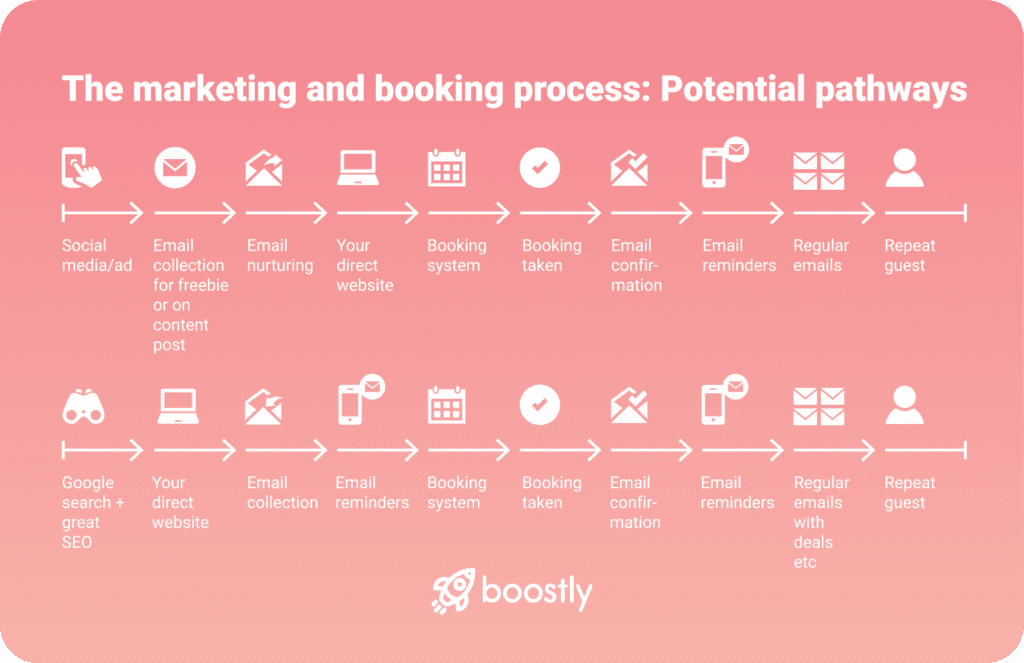
Vacation rental marketing: Freedom from OTAs
Long story short: there are a huge number of ways for vacation rental managers to market their short-term vacation rental business without relying on OTAs.
The key is to choose a few platforms to focus on, set up a marketing plan that feels manageable yet effective, track your chosen metrics, and keep tweaking until you find the winning formula.
Overall, marketing is about building relationships, whether you’re just meeting a potential guest, or getting them to know, like and trust you on the way to making a booking at your vacation rental listing, whether it’s their first or fiftieth.
Maintaining control of your own marketing and bookings means your vacation rental business is truly in your own hands, and not dependent on the whims and problems inherent with rental sites and OTAs – and gathering email addresses means you’re not dependent on social media to sell.
Serious owners in the vacation rental industry know that they cannot rely on OTAs, and need their own marketing plan to succeed. It might not be easy, but it’s worth it.
Getting to grips with online marketing – step by step, one marketing channel or platform at a time – will futureproof your rental, help you build up strong relationships with your guests, and ensure that you’re able to get ideal customers booking again and again. No OTAs required.
Why be dependent on OTAs like Airbnb and Booking.com? Did you know you can save thousands on commission fees by getting direct bookings? Get our free blueprint on how to double direct bookings for free.
Takeaway (TL;DR): As a short-term vacation rental owner, you don’t have to rely on OTAs such as Airbnb for your marketing. With a little bit of know-how and simple strategy, you can successfully leverage social media platforms, your own email list, and your own website and direct booking system to market and sell your rental as easily as possible, without handing over all control or commission to OTAs.


